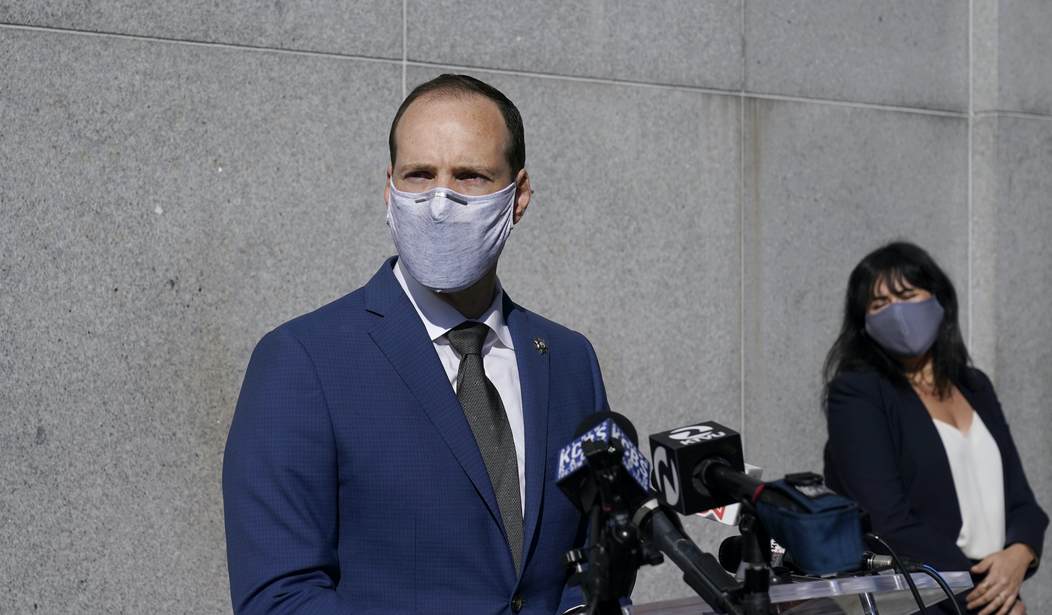What might have been the first clue? In reality, voters had begun revolting against prosecutorial dereliction and policies that set criminals loose to offend with impunity for the better part of two years. Progressives and their media allies (with some exceptions) have tried convincing voters that all is well.
Now that voters have a say, the response is unmistakable. The New York Times reports the “message” sent to Democrats in its news section:
Voters in California delivered a stark warning to the Democratic Party on Tuesday about the potency of law and order as a political message in 2022, as a Republican-turned-Democrat campaigning as a crime-fighter vaulted into a runoff in the mayoral primary in Los Angeles and a progressive prosecutor in San Francisco was recalled in a landslide.
The two results made vivid the depths of voter frustration over rising crime and rampant homelessness in even the most progressive corners of the country — and are the latest signs of a restless Democratic electorate that was promised a return to normalcy under President Biden and yet remains unsatisfied with the nation’s state of affairs.
“People are not in a good mood, and they have reason not to be in a good mood,” said Garry South, a Los Angeles-based Democratic strategist. “It’s not just the crime issue. It’s the homelessness. It’s the high price of gasoline.”
For voters, their daily lived experiences will always take precedence at the ballot box. When economies function well and households can afford to spend on luxuries, then secondary and tertiary issues may matter in elections. When inflation is running away, gas prices double in a year, and you live in areas suddenly ridden with violent crime, those issues will drive voters no matter what messaging gets used or how much money is behind it.
We’ve seen hints of this in other primary results before yesterday, and even in Virginia’s election last year, in which education and parental access became acute. Yesterday’s revolt in deep-blue California made that dynamic unmistakable.
James Hohmann covers that messaging in the Washington Post’s opinion section, in contrast with the NYT’s treatment. In contrast to the usual approach to law-and-order reaction, however, Hohmann chooses an interesting and somewhat compelling frame of reference for Boudin’s recall:
More people died in San Francisco last year from fentanyl overdoses than covid-19, yet District Attorney Chesa Boudin did not convict a single person in 2021 for dealing the lethal opioid.
This helps explain why one of the most liberal cities in America voted overwhelmingly on Tuesday to recall Boudin and repudiate the prosecutor’s soft-on-crime approach.
Boudin’s defeat is the latest wake-up call for Democrats, who have lost the public’s trust on criminal justice and play down voter anxieties about crime at their peril. …
Boudin pulled out all the stops as he clung to his job. He tried to gaslight residents by pretending crime wasn’t as bad as voters perceived. He blamed courts for shutting down during the pandemic. He blamed cops for not making enough arrests. Voters saw through the desperation.
It’s not just Boudin that has been “gaslighting” voters on crime, and it wasn’t limited to his recall period. Democrats have been playing these same Jedi mind tricks in urban centers across America in desperate attempts to avoid Hohmann also suggests a potential spin from Democrats who want to avoid Boudin’s stink. A lot of them might pretend that Boudin never did represent them:
Boudin was never beloved by local party officials. The Democratic establishment, including former senator (and district attorney before that) Kamala D. Harris, endorsed a more pragmatic candidate who had been a successful prosecutor in the office.
Come on, man. Boudin himself might have faced some establishment opposition in his initial foray, but Boudin was no fluke either. He was among the vanguard of radical-progressive attorneys pushed by the Left into district attorney offices around the country, a movement that suited Democrats enough at the time to brag about their reform-minded agenda. Democrats took credit for their decarceration policies right up to the moment when it became clear that those policies had turned their urban power bases into toxic, blighted communities.
Democrats own these policies, just as they have owned urban policies for decades. Voters have finally gotten fed up enough to push back, but their anger has been clear and palpable for at least the last couple of years. Their losses in deep-blue areas of a deep-blue state are bad enough now that even the media has stopped spinning crime and its impact. And even Democrats now admit that it’s not just crime, but homelessness and inflation that voters care about most — and they’re failing on all counts.








Join the conversation as a VIP Member